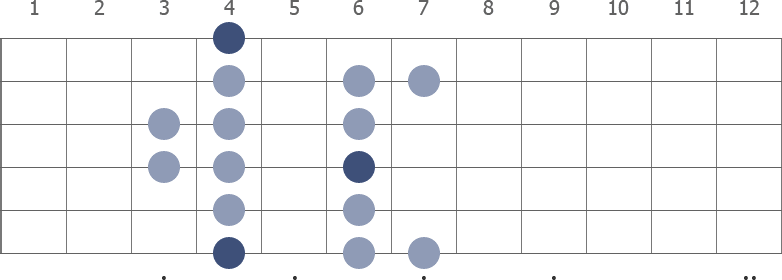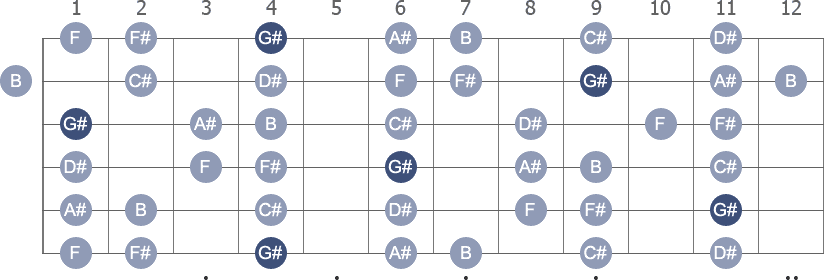G# Dorian
G# Dorian scale for guitar.
The G sharp Dorian is a seven-note scale. Colored circles in the diagram mark the notes, with darker color highlighting the root notes. In the two-octave pattern, the first root note is on the 6th string, 4th fret.
G# Dorian 2 octaves

G# Dorian full fretboard

G# Dorian note names

The scale displayed with its numeric formula, notes, intervals and scale degrees.
| Formula | Notes | Intervals | Degrees |
|---|---|---|---|
| 1 | G# | Unison | Tonic |
| 2 | A# | Major second | Supertonic |
| b3 | B | Minor third | Mediant |
| 4 | C# | Perfect fourth | Subdominant |
| 5 | D# | Perfect fifth | Dominant |
| 6 | E# | Sixth | Submediant |
| b7 | F# | Minor seventh | Subtonic |
The sixth degree is written as E#, which is the same as F. A practice in a scale notation is to not include the same letter twice, if it can be avoided.
The G sharp Dorian scale consists of seven notes. These can be described as steps on the guitar fingerboard according to the following formula: whole, half, whole, whole, whole, half and whole from the first note to the same in the next octave.
The G sharp Dorian is the second mode of the F# Major Scale. It contains exactly the same notes, but starts on another note. Since Dorian has a Minor scale quality it can also be seen as a mode of the D# Minor.
The G sharp Dorian can also be recognized as an G# Major Scale with a flattened third and a flattened seventh (B and F# instead of B# and F##).
The scale is otherwise most related to the G# Natural Minor and G# Melodic Minor scales, which differ with just one note in both cases.
This scale is typically played over a minor seventh chord (primarily G#m7 in this case) and is used in styles such as jazz and blues. It is sometimes called G sharp Jazz Minor (it shouldn't be confused with the Melodic Minor, which also is reckoned as a minor jazz scale).
One way to learn this scale is to observe the minor 7th chord shapes that it is built around. For example, the G#m7 barre chord with the root on the 6th string within the scale in 4th position. Another way is to think of it as the G# Minor scale with a raised sixth.
Chords that are related to this scale are the following:
| G#m7, G#m9, G#m11 |
| A#m7 |
| Bmaj7, Bmaj9 |
| C#7, C#9, C#11, C#13 |
| D#m7, D#m9, D#m11 |
| Fm7b5 |
| F#maj7, F#maj9, F#maj13 |
The tones in these chords correspond to the tones of the G# Dorian scale (triads have been excluded).
Related to this scale are Dorian b2 and Dorian #4, being the 2nd mode of the Melodic Minor and the 4th mode of the Harmonic Minor.
The G# Dorian b2 scale, also known as G# Phrygian #6 scale, is identical with the G# Dorian except for the minor second. It can be displayed as follows:
| Formula | Notes | Intervals | Degrees |
|---|---|---|---|
| 1 | G# | Unison | Tonic |
| b2 | A | Minor second | Supertonic |
| b3 | B | Minor third | Mediant |
| 4 | C# | Perfect fourth | Subdominant |
| 5 | D# | Perfect fifth | Dominant |
| 6 | E# | Sixth | Submediant |
| b7 | F# | Minor seventh | Subtonic |
The G# Dorian b2 contains the same notes as the F# Melodic Minor Scale, but starts on another note.
The G# Dorian #4 scale is identical with the G# Dorian except for the augmented fourth. It can be displayed as follows:
| Formula | Notes | Intervals | Degrees |
|---|---|---|---|
| 1 | G# | Unison | Tonic |
| 2 | A# | Major second | Supertonic |
| b3 | B | Minor third | Mediant |
| #4 | C## | Augmented fourth | Subdominant |
| 5 | D# | Perfect fifth | Dominant |
| 6 | E# | Sixth | Submediant |
| b7 | F# | Minor seventh | Subtonic |
The G# Dorian #4 contains the same notes as the D# Harmonic Minor Scale, but starts on another note.
Start the audio and play along with your guitar! Use notes from the scale in the diagram above.
Normal tempo: